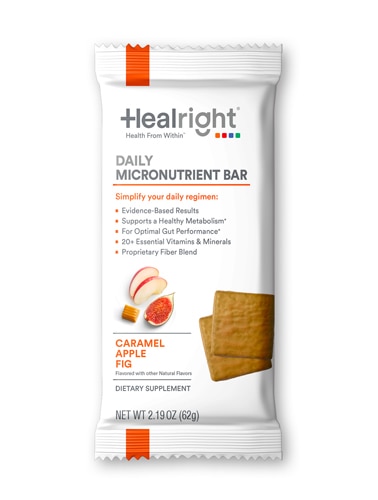[vc_row][vc_column][vc_column_text]Although the word "metabolism" is often associated with calorie burn and weight loss, it actually describes your body's entire process of energy generation, growth, repair and reproduction.
Digestion is a major part of this process. As food passes through your digestive system, your body breaks it down into a collection of sugars, amino acids and fatty acids. Your pancreas secretes insulin to transport sugar into your cells, where it fuels production of the energy molecule ATP. Meanwhile, your liver processes amino acids and fats into building blocks for body structures like bones, muscles and cell membranes.
Energy from these metabolic processes fuel
all your body's major functions, including breathing, circulation, cell growth and repair, and body temperature regulation.

How does the gut microbiome affect metabolism?
Since digestion is a major part of metabolism, it's no surprise that your gut microbiome—the trillions of bacteria and other microbes that colonize your digestive tract—is involved in the process. What goes on in
your gut may influence your energy levels, weight and risk for metabolic disorders like type 2 diabetes.
Much of what scientists know about the interactions between gut microbes and metabolic processes comes from animal studies. A
2023 review published in Advances in Nutrition summarizing major takeaways from existing research showed four ways the microbiome may affect metabolism:
1. Short-chain fatty acid (SCFA) production.
Gut microbes break down dietary fiber to produce SCFAs. These compounds that appear to increase energy expenditure, promote
brown fat, and boost production of hormones that make you feel full, a combination that may promote healthy body weight.
2. Inflammation.
Some types of microbes trigger
inflammation, which may actually increase calorie burn. However, inflammation can also damage the gut lining and allow pro-inflammatory molecules called lipopolysaccharides to enter the bloodstream. Lipopolysaccharides may slow metabolism down while promoting hunger, leading to excess caloric intake.
3. Fatty acid metabolism.
Different types of gut microbes can influence how fats are processed and absorbed. Microbes that produce SCFAs appear to help
reduce levels of fatty acids in the blood, which may play a role in weight management. Some SCFAs may regulate
cholesterol metabolism and triglyceride production to help maintain healthy blood cholesterol levels.
4. Bile acid regulation.
Gut microbes metabolize bile acids into byproducts that may increase or decrease metabolism by regulating inflammation and influencing how the liver processes fats.
More interventional and observational studies are needed to understand whether these processes work the same way in humans and how the gut microbiome may affect metabolic health.
Metabolic syndrome: When metabolism goes awry
Sometimes metabolism doesn't work as it should. Such is the case in metabolic syndrome, also called "Syndrome X," a constellation of signs and symptoms that indicate a disruption in how your body processes nutrients and makes energy.
Metabolic syndrome affects about 41.8% of the U.S. population and is characterized by:
- Excess abdominal fat
- Chronic inflammation
- High fasting blood sugar
- High blood pressure
- High triglycerides and low HDL ("good" cholesterol)
People with metabolic syndrome have a higher risk of developing type 2 diabetes, cardiovascular disease, neurological disorders, organ damage and certain types of cancer.
Can a healthy gut reduce the risk of metabolic syndrome?
Many correlations that scientists have noted between the microbiome and metabolism suggest gut health may be an important factor in preventing or managing metabolic syndrome.
The "obese" microbiome hypothesis
A popular hypothesis based on observations in both animal and human studies is the existence of "obese" and "lean" microbiomes. In this hypothesis, the ratio between
Firmicutes and
Bacteroidetes bacteria in the gut may affect how efficient the microbiome is at extracting energy. If this is the case, people with "obese" microbiomes may absorb more calories from the same amount of food than those with "lean" microbiomes.
SCFA activity in metabolic syndrome
Interactions between SCFAs and metabolism could influence risk factors for metabolic syndrome. For example, an SCFA called propionate appears to
reduce body weight and body fat as well as glucose production in the liver, which may help
keep blood sugar at healthy levels.
How to improve gut health for better metabolism
Based on this evidence, dietary choices appear to be the main factor affecting gut health and metabolism. To keep your microbiome healthy and balanced:
- Eat an appropriate amount of calories for your age, size and activity level. Some evidence shows that overeating can change the composition of your microbiome and increase caloric absorption.
- Moderate your fat intake. High-fat diets are associated with pro-inflammatory gut microbes, which may increase your risk of metabolic syndrome. One small study showed that these microbial changes may also contribute to increased weight and body fat.
- Eliminate ultra-processed foods. Food manufacturers add fat, salt and sugar to their products to replace flavor lost in processing. This combination may promote the growth of pro-inflammatory gut microbes that can damage your gut and disrupt your metabolism.
- Swap animal protein for plant protein. Eating plant-based protein sources like lentils, beans and tempeh may increase the abundance of Prevotella bacteria relative to Bacteroides in your gut. Evidence suggests this high P/B ratio may help you lose more weight and body fat when practicing reasonable caloric restriction.
- Increase fiber intake. Add more vegetables, fruits, whole grains and beans to your diet to give gut bacteria fuel for making SCFAs. Increased SCFA production may help you burn more calories to support healthy weight maintenance.
Do probiotics improve metabolism?
Existing research shows that adding a probiotic supplement to your dietary regimen may support
BMI,
body fat,
inflammation and glucose metabolism. However, these effects aren't significant enough to suggest probiotics can effectively support a healthy metabolism.
†
Metabolism and the microbiome are complex, so it's difficult for researchers to determine how or whether probiotics can support healthy metabolic outcomes. Research does show that supplementing with probiotics may help support the
composition of your gut microbiome, but more studies are needed to determine how probiotics may interact with metabolic pathways.
†
†These statements have not been approved by the Food and Drug Administration. These products are not intended to diagnose, treat, cure or prevent disease.[/vc_column_text][/vc_column][/vc_row][vc_row][vc_column][vc_text_separator title="Featured Products" border_width="2"][vc_row_inner equal_height="yes" content_placement="middle" gap="35"][vc_column_inner width="1/3"][vc_single_image image="171328" img_size="full" alignment="center" onclick="custom_link" img_link_target="_blank" css=".vc_custom_1702594230442{padding-right: 7% !important;padding-left: 7% !important;}" link="https://www.vitacost.com/bareorganics-slim-care-superfood-tea-oolong-tea"][/vc_column_inner][vc_column_inner width="1/3"][vc_single_image image="171327" img_size="full" alignment="center" onclick="custom_link" img_link_target="_blank" css=".vc_custom_1702594252604{padding-right: 7% !important;padding-left: 7% !important;}" link="https://www.vitacost.com/natures-way-fortify-optima-50-probiotic-50-billion-live-cultures"][/vc_column_inner][vc_column_inner width="1/3"][vc_single_image image="171326" img_size="full" alignment="center" onclick="custom_link" img_link_target="_blank" css=".vc_custom_1702594269999{padding-right: 7% !important;padding-left: 7% !important;}" link="https://www.vitacost.com/country-life-metabolism-reboot"][/vc_column_inner][/vc_row_inner][/vc_column][/vc_row]




